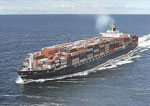 Wall Street Journal: States can deny docking privileges to the ships of companies that do business in Iran. Ocean transportation is critical for the import of raw materials required for Iran’s nuclear program. Cutting off access to these raw materials would hamper Tehran’s nuclear drive. The Wall Street Journal
Wall Street Journal: States can deny docking privileges to the ships of companies that do business in Iran. Ocean transportation is critical for the import of raw materials required for Iran’s nuclear program. Cutting off access to these raw materials would hamper Tehran’s nuclear drive. The Wall Street Journal
States can deny docking privileges to the ships of companies that do business in Iran.
By MARK D. WALLACE
 At Bandar Abbas, Iran’s largest port, ships bearing the distinctive “Evergreen” insignia dock and unload their cargo. On the other side of the world, Evergreen vessels make their scheduled calls at Los Angeles Harbor, the biggest container port in the United States.
At Bandar Abbas, Iran’s largest port, ships bearing the distinctive “Evergreen” insignia dock and unload their cargo. On the other side of the world, Evergreen vessels make their scheduled calls at Los Angeles Harbor, the biggest container port in the United States.
This isn’t unusual. Several of the world’s leading shipping lines routinely operate in Iranian ports—and then they continue to do business in major ports across the U.S. This is contrary to the spirit of U.S. and European Union sanctions, and it needs to be stopped.
The National Defense Authorization Act, signed by President Obama in January, contains a provision that authorizes sanctions against any person who knowingly supports activity benefiting port operators in Iran. The main port operator in Iran, Tidewater Middle East Co., is already blacklisted by the U.S. Treasury since it is controlled by Iran’s Islamic Revolutionary Guard Corps, which manages Tehran’s nuclear and ballistic-missile programs. Despite attempts to conceal its ownership, Tidewater operates all of Iran’s major ports—including the Shaheed Rajaee Complex at Bandar Abbas, through which 90% of Iran’s container traffic passes.
Ocean transportation is critical for the import of raw materials required for Iran’s nuclear program. Cutting off access to these raw materials would hamper Tehran’s nuclear drive.
In addition to Evergreen (based in Taiwan), the United Arab Shipping Company fleet, jointly owned by six Persian Gulf states, makes calls at four Iranian ports: Asaluyeh, Bandar Khomeini, Khorramshahr and Bandar Abbas.
This information is hardly secret. The websites of the United Arab Shipping Company (and other shippers such as Yang Ming, based in Taiwan) openly list offices run out of Tehran or Bandar Abbas. And despite its regular business with Iranian port operators, the United Arab Shipping Company’s vessels visit the ports of Baltimore, Miami, New York/New Jersey, Norfolk and Savannah (according to the company’s website).
These shipping companies support the IRGC and the Tehran regime by using Tidewater-operated terminals and paying port loading fees.
America’s port authorities should deny docking privileges to shipping companies that continue to operate in Iran. All shippers should be presented with a clear choice: Stop doing business in Iran, or stop doing business with the U.S.
In particular, the Los Angeles Board of Harbor Commissioners, the Georgia Ports Authority, various Florida port authorities and the Maryland Port Administration can declare that their respective ports are off-limits to shippers active in Iran. The Federal Maritime Commission, based in Washington, D.C., can support them.
The ban should include all shippers docking at Iranian ports, operating offices in Iran, or importing and exporting into and out of Iran (with exceptions on humanitarian grounds). I am confident that if they were faced with such a choice, shippers like Evergreen would choose America’s business over Iran’s. This would further isolate the Tehran regime.
In the 2010 Comprehensive Iran Sanctions, Accountability, and Divestment Act, Congress explicitly invited state and local governments and agencies to assist with the implementation of federal sanctions policy. Thus state legislatures, local governments and port authorities can take action to ensure that ports under their control effectively bar shippers that make port calls at Iranian ports.
No company should be directly or indirectly supporting an Iranian regime that maintains an illicit nuclear-weapons program, is the world’s most active state sponsor of terrorism, helped kill U.S. servicemen in Iraq and Afghanistan, and continues grisly violations of its own citizens’ rights.
Several rounds of sanctions against Iran have been enacted by the United Nations, the U.S. and the EU. American ports have the authority and the duty to help enforce them.
Mr. Wallace is CEO of United Against Nuclear Iran. He served as U.S. ambassador to the United Nations, representative for U.N. management and reform from 2006-08.


